|
|
|
Sort Order |
|
|
|
Items / Page
|
|
|
|
|
|
|
| Srl | Item |
| 1 |
ID:
188312


|
|
|
|
|
| Summary/Abstract |
On the 20 March 2003, George W. Bush launched Operation ‘Iraqi Freedom’. At the time, it was unlikely anyone in his administration envisaged that United States (US) troops would eventually rely on the largest force of private military contractors in recent times. Victory over Saddam Hussein and the ensuing occupation and reconstruction of Iraq would have not happened without the support of military contractors working behind the scenes to ensure that combat troops receive adequate supplies, maintain vehicles and equipment, and protect military bases and convoys. In Afghanistan, the US and the other countries participating in the North Atlantic Treaty Organization (NATO) International Security Assistance Force mission relied on contractors providing logistics and armed security to an even larger extent. The NATO-trained Afghan military itself inherited US dependence on contractors, whose departure from Afghanistan alongside American soldiers was identified as one of the factors underlying Kabul armed forces’ inability to confront the Taliban’s advance.
|
|
|
|
|
|
|
|
|
|
|
|
|
|
|
|
| 2 |
ID:
143637
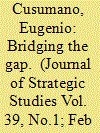

|
|
|
|
|
| Summary/Abstract |
The increasing use of private military and security companies (PMSCs) has attracted considerable scholarly attention due to its corrosive effects on US democracy. Drawing on neoclassical realism, this article provides a comparative dimension to the study of the political drivers of military privatisation by analysing contractor support to US and UK operations in Iraq and Afghanistan. Domestic political constraints have shaped both US and UK response to the need for more boots on the ground, increasing the propensity to use contractors as a force multiplier in spite of their problematic impact on military effectiveness.
|
|
|
|
|
|
|
|
|
|
|
|
|
|
|
|
| 3 |
ID:
141165
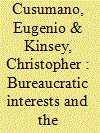

|
|
|
|
|
| Summary/Abstract |
In spite of its sensitivity, diplomatic protection has received very sporadic scholarly attention. This article provides a comparative analysis of US and UK diplomatic security policies, focusing on the increasing use of private military and security companies (PMSCs) for the protection of foreign service and development agencies’ personnel. The existing theoretical explanations of the privatization of security tasks cannot explain why countries displaying similar material incentives and similar political and market cultures have outsourced diplomatic protection to different degrees, nor can they account for variance in the use of PMSCs by different agencies within the same country. Our analysis highlights the importance of investigating organizations’ interests in providing a more accurate explanation of the varying propensity to outsource armed protection. In both the United States and the United Kingdom, the outsourcing of diplomatic security was a resultant of foreign policy bureaucracies and military organizations’ preferences.
|
|
|
|
|
|
|
|
|
|
|
|
|
|
|
|
| 4 |
ID:
173750
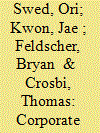

|
|
|
|
|
| Summary/Abstract |
From an obscure sector synonymous with mercenaryism, the private military and security industry has grown to become a significant complementing instrument in military operations. This rise has brought with it a considerable attention. Researchers have examined the role of private military and security companies in international relations as well as the history of these companies, and, above all, the legal implications of their use in the place of military organizations. As research progresses, a significant gap has become clear. Only a handful of studies have addressed the complex of issues associated with contractors’ demographics and lived experience. This article sheds some light over this lacuna, examining contractors’ demographics using descriptive statistics from an original data set of American and British contractors who died in Iraq between the years 2003 and 2016. The article augments our understanding of an important population of post-Fordist-contracted workforce, those peripheral workers supplementing military activity in high-risk occupations with uncertain long-term outcomes.
|
|
|
|
|
|
|
|
|
|
|
|
|
|
|
|
| 5 |
ID:
178188


|
|
|
|
|
| Summary/Abstract |
International relations scholarship has paid insufficient attention to security providers’ tendency to emulate the visual attributes of other actors in an attempt to (re)construct their identities and increase their legitimacy by signalling adherence to prevailing norms. Research on the discourses deployed by private military and security companies (PMSCs), for instance, has relied almost exclusively on the analysis of written documents. This article argues that even basic visual units like logos serve as windows into the genealogy and evolution of the international market for force. By combining insights from Peircean semiotics and institutionalist theory, I show that PMSCs’ logos are not only marketing tools, but also symbolic acts that shed light upon the shifting identities and legitimization strategies of the international private security industry. Specifically, I argue that PMSCs’ logos can be conceptualized as forms of camouflaging, blame-shifting, mirroring and socialization into corporate identities. These overlapping processes have reshaped the international private security industry brandscape, informing a shift away from the use of logos displaying symbols and colours borrowed from military visual identity systems.
|
|
|
|
|
|
|
|
|
|
|
|
|
|
|
|
| 6 |
ID:
139199
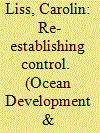

|
|
|
|
|
| Summary/Abstract |
In response to the increasing employment of Privately Contracted Armed Security Personnel (PCASP) to protect vessels against pirate attacks, some flag states introduced new regulations that allow the use of PCASP. The introduction of these new regulations was at least in part an attempt to (re)establish state control of violence. This article provides the background and theoretical framework for this special issue, which discusses how states with national registers approached the regulation of PCASP. Summarizing its major findings, the article concludes that even when states attempted to govern the use of PCASP, operational difficulties resulted in significant shortcomings in state control.
|
|
|
|
|
|
|
|
|
|
|
|
|
|
|
|
| 7 |
ID:
139202
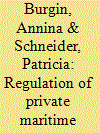

|
|
|
|
|
| Summary/Abstract |
The use of private military and security companies (PMSCs) has become an increasingly popular measure to counter maritime piracy. This article examines how two established maritime nations, Germany and Spain, have approached the regulation of maritime PMSCs. The article demonstrates that there are similarities but also significant differences between the two regulatory systems and concludes that the governance frameworks that emerged are tailored to the needs of each state. While Germany underwent a long process to establish a sophisticated licensing scheme specifically designed for maritime PMSCs, Spain swiftly applied the framework that governs PMSCs active on land to those companies operating at sea.
|
|
|
|
|
|
|
|
|
|
|
|
|
|
|
|
| 8 |
ID:
139204
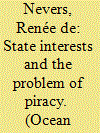

|
|
|
|
|
| Summary/Abstract |
The U.S. and the UK supported the introduction of PMSCs on merchant vessels to address Somali piracy. This article describes U.S. and UK regulations and guidelines for PMSCs and shippers seeking to hire them. A central concern for each has been ensuring control of the weapons to be used by PMSCs. The U.S. has also sought to vet contractors to ensure the security of U.S. ports and transport facilities, while the UK has focused on ensuring that contractors and companies meet its firearms requirements. These distinctions reflect differences in the regulation of firearms in the U.S. and the UK.
|
|
|
|
|
|
|
|
|
|
|
|
|
|
|
|
| 9 |
ID:
159152


|
|
|
|
|
| Summary/Abstract |
Private military and security companies (PMSCs) play an increasingly important role in the provision of security-related services. In their attempts to win new clients and find suitable personnel, they take on different identities by presenting themselves as conventional businesses, military actors, and humanitarians. In this article, we examine how PMSCs deploy these identities when they recruit new personnel through social media. Our computer-assisted content analysis of Twitter messages posted by two major United States-based companies—CACI and DynCorp International—shows that while both PMSCs amplify their business and military identities to attract the most talented personnel, they construct and communicate these identities in different ways with CACI branding itself as a sophisticated, modern, and patriotic business and DynCorp as a home-grown, traditional military provider. In addition, our analysis lends force to scholars suggesting that state militaries and the private security sector compete increasingly for prospective employees using similar strategies.
|
|
|
|
|
|
|
|
|
|
|
|
|
|
|
|
| 10 |
ID:
188321
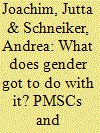

|
|
|
|
|
| Summary/Abstract |
While war and the military have been recognized as being gendered sites, Private Military and Security Companies (PMSCs) are only rarely studied through a gender lens. Compared to functional, political-instrumental or ideational explanations with respect to the privatization of security, such a lens captures, however, the micro-dynamic and political processes of PMSCs’ boom. We show that gender is, first, constitutive of companies’ corporate identities as hero warriors and professional security experts. Second, it is relational, (re-)producing hierarchical power relations among and within PMSCs and with state security actors. Third, gender is a legitimizing factor helping PMSCs to establish themselves as acceptable security actors vis-à-vis others.
|
|
|
|
|
|
|
|
|
|
|
|
|
|
|
|
|
|
|
|
|